
8 minute read
RPS Documentary Photographer of the Year 2019 Competition
The Documentary Photographer of the Year (DPOTY) competition is organised by the Royal Photographic Society's Documentary Group. The competition has been running since 2012 and provides an opportunity to showcase documentary work and storytelling by members. The 2019 competition was judged by Alys Tomlinson, Steve Kingswell and Mark Phillips. The Awards event was held on 11 January 2020 at RPS HQ where Lina Geoushy was announced as the overall winner for her project 'Breadwinners'.
Advertisement
The January 2020 edition of the Documentary Group journal, The Decisive Moment, is dedicated to the DPOTY competition and features all the images from the winning entry, finalists and shortlisted photographers.
Documentary Photographer of the Year 2019 - Overall Winner - Lina Geoushy for her project 'Breadwinners'

Mark Phillips announces Lina Geoushy as the Winner of DPOTY 2019
Graham Land ARPS
Breadwinners
In a patriarchal society where men can expect to control their wives’ career choices and have a final say over all household matters, a woman may go out into the world, find a job as a housekeeper, earn money, and support her whole family. However, her power and status at home may not change at all, so she ends up carrying the burden, rather than the privilege of being the sole provider.
‘Breadwinners’ is a record of female housekeepers who are overlooked and relegated to the fringes of Egyptian society. In this personal project, I took a documentary and portrait approach to produce a series of portraits shedding light on and representing female housekeepers employed in homes in Cairo, Egypt. It is also a series of self-education and investigation into the impact of Egyptian culture and the prevailing power of patriarchy on these women’s lives.

From the project 'Breadwinners'
Lina Geoushy
Finalists
Robert K Hughes LRPS - 'The Shoot'

From the project 'The Shoot'
Robert K Hughes LRPS
Hil Van Der Waal ARPS - 'Camel Ardha, A camel showcasing event in Oman'

From the project 'Camel Ardha, A camel showcasing event in Oman'
Hil Van Der Waal ARPS
A J Wood ARPS - 'Punters'

From the project 'Punters'
A J Wood ARPS
Paul Lanigan FRPS - 'Pairc Life'

From the project 'Pairc Life'
Paul Lanigan FRPS
Shortlisted Entries
Steve Reynolds ARPS - 'An illustration of the difficult manual labour working conditions in Bangladesh'

From the project 'An illustration of the difficult manual labour working conditions in Bangladesh'
Steve Reynolds ARPS
Rachel Wallace ARPS - 'Nothing gold can stay'

From the project 'Nothing gold can stay'
Rachel Wallace ARPS
Chris Jennings ARPS - 'A Day At The Dogs'

From the project 'A Day At The Dogs'
Chris Jennings ARPS
Graham Land ARPS - 'Enterprising Croydon'

From the project 'Enterprising Croydon'
Graham Land ARPS
Paul Sansome - 'The Last Generation'

From the project 'The Last Generation'
Paul Sansome
Prizes
The top prize in the Documentary Photographer of the Year 2019 competition is a day with Simon Roberts HonFRPS and is an opportunity for the winner, Lina Geoushy, to work with him on an aspect of her photographic practice.

From the project 'Merrie Albion'
Simon Roberts HonFRPS
Simon Roberts is a British artist-photographer whose work deals with notions of identity and belonging and our relationship to the landscape. He has published and exhibited widely, and his photographs reside in major public and private collections such as the Deutsche Börse Art Collection, George Eastman House and the V&A. In 2010, he was commissioned as the official British Election Artist, by the House of Commons Works of Art Committee, to produce a record of the General Election on behalf of the UK Parliamentary Art Collection; and in 2013 was made an Honorary Fellow of the Royal Photographic Society. His recent published work includes We English, Merrie Albion exploring events in Britain over the last decade, and Green Lungs of the City, exploring urban green spaces. He was interviewed in the December 2018 edition of The Decisive Moment.
All five finalists were presented with a copy of Documentary Photography Reconsidered. Documentary photography is undergoing an unprecedented transformation as it adapts to the impact of digital technology, social media and new distribution methods. In this book, photographer and educator Michelle Bogre contextualizes these changes by offering a historical, theoretical and practical perspective on documentary photography from its inception to the present day.
The Judging Process
Anyone entering a competition, even a free one like the DPOTY, would like to think the judging process is fair. Few competitions provide any real insight into how judging is undertaken. To improve transparency and provide more awareness, we have outlined the process used when selecting DPOTY winners.
The rules, in terms of entry requirements, were publicised and part of the submission process. Anyone not meeting these rules (e.g. not using the file naming convention or submitting the wrong number of images) was initially rejected and provided with an explanation and opportunity to re-submit. All the entries were downloaded from the printspace hub website and put into a shared Dropbox, allowing all three judges access to the images to conduct their initial review in their own time. Unfortunately, there were some delays in the process caused by availability and technical issues when accessing the images.
The actual judging was conducted by the three judges independently and ‘blind’, so that the names of the photographers were not known. The judges only had the images, the sequence, and the photographer’s statement to review. Initial judging was against three criteria:
• Intent and Narrative (did the images address the intent and provide a relevant narrative).
• Engagement and Impact (did the images engage the viewer and provide impact, visually or emotionally).
• Technical and Production (were the images well produced, in focus where necessary, and processed sympathetically with the intent).
Using this criteria, all competition entries were marked from one to three in each category, giving a maximum potential score of nine. From each judge, their highest scoring entries (typically around eight to ten) were selected for further review.
The judges then held a series of reviews (via Skype) to work towards a final shortlist. Initially entries which were selected by all three judges were included, being considered as shortlisted and potential finalists. Those selected by two judges were then reviewed. Finally, those selected by only one judge were discussed in order to understand that judge’s view, and then considered for shortlisting. Factors that influenced selection included the original judging criteria, considered now in more depth. Focus was given to factors like: whether the subject had been addressed in a way consistent with the statement; whether the image sequencing really worked; whether there were repetitious images or images that did not seem to add to the narrative; whether there were technical issues, like focus and framing or over-processing.
The process helped develop a rough shortlist of around fifteen entries. The judges then met in person to review projected images of all potential shortlisted entries All fifteen were reviewed again, but the focus now was to re-consider the narrative. There was discussion on the extent to which there was evidence of research and a considered body of work, rather than just an opportunistic set of images. The other key factors were whether the series had impact and offered something a little different or interesting which helped differentiate it from other entries. During this meeting, ten shortlisted entries were selected, from which the five finalists were agreed as those having the strongest and most coherent sets. Finally, one overall winner was chosen, unanimously.
Judges
Alys Tomlinson - an award-winning editorial and fine art photographer based in London. Alys was named Sony World Photography Awards, Photographer of the Year 2018 and Winner of the Public Prize, Rencontres d’Arles, Discovery Award 2019.
Steve Kingswell - a photographer and photography judge. Steve has judged the DPOTY on previous occasions and has exhibited internationally.
Mark Phillips - is Chair of the Documentary Group in the RPS and a documentary photographer, with work published in the Independent newspaper and various magazines.
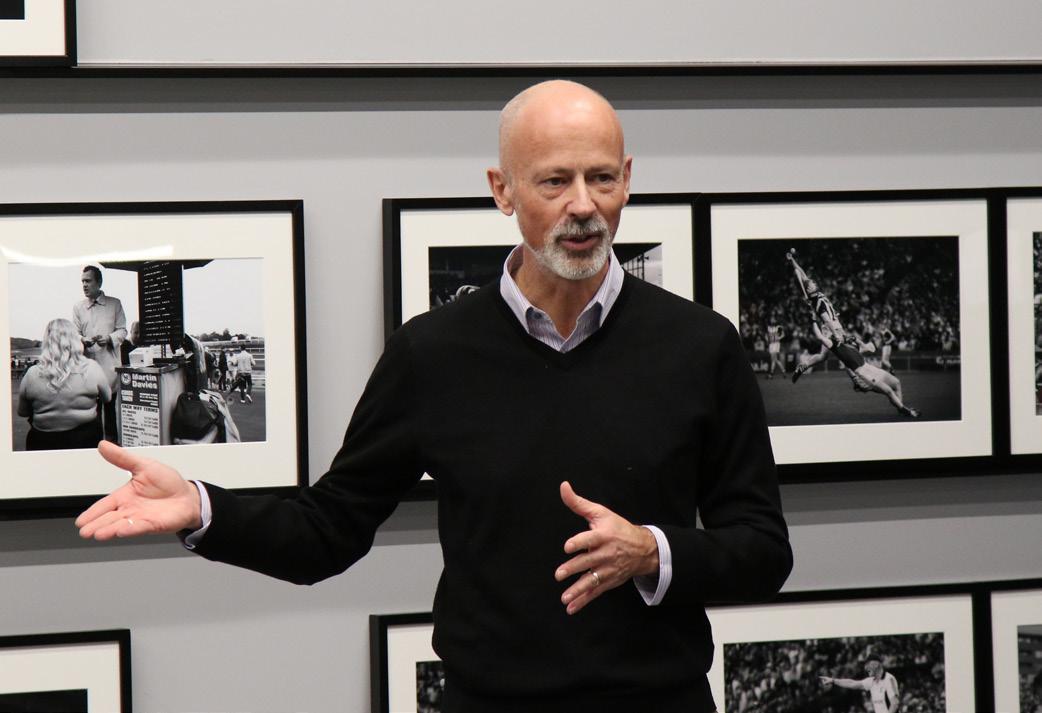
DPOTY Judge Steve Kingswell
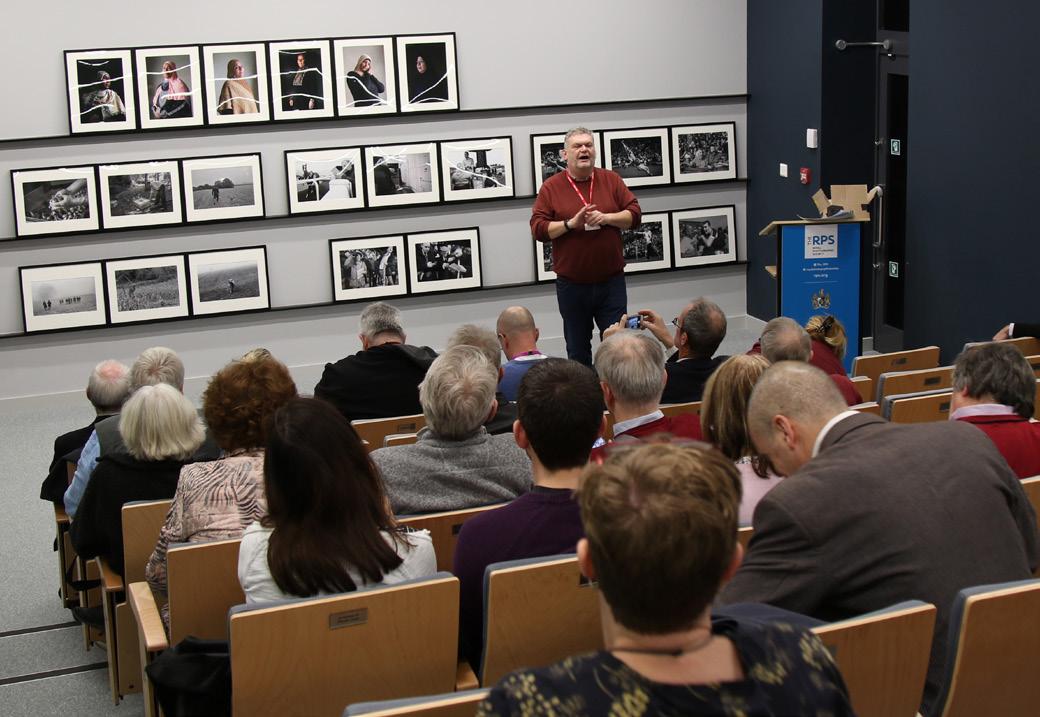
Documentary Group Chair and Judge Mark Phillips
Awards Event

In January 2020 the Royal Photographic Society hosted the Documentary Photographer of the Year 2019 awards event at RPS HQ, Bristol. The shortlisted entries had been announced in November 2019 and all had been invited to the event where the five finalists and the overall winner were to be announced.
The afternoon opened with a few words of welcome from the Documentary Group Chair, Mark Phillips, followed by a drinks reception in the foyer where all images from the ten shortlisted entries were being displayed on the main screen.
The doors to the auditorium were opened to reveal the printed images from the five finalists. The attendees took their seats for the presentation of certificates to the shortlisted entrants, and the finalists (who also received a copy of Michelle Borge’s book Documentary Photography Reconsidered). Mark Phillips then announced Lina Geoushy as the overall winner.
Mark and fellow judge Steve Kingswell discussed the judging process and the competition in more detail before bringing the formal part of the event to a close. Mark, Steve and Peter Haynes FRPS (Chair, Royal Photographic Society Distinctions Committee) were on hand to discuss the projects in more detail.

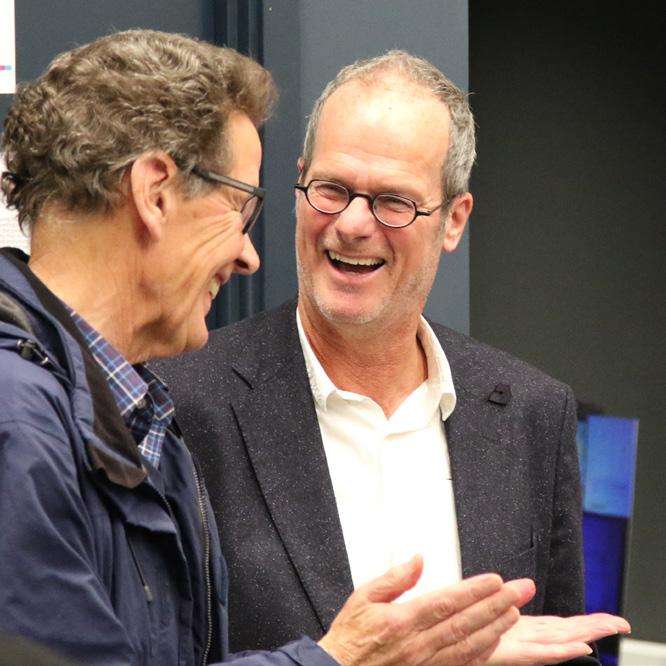
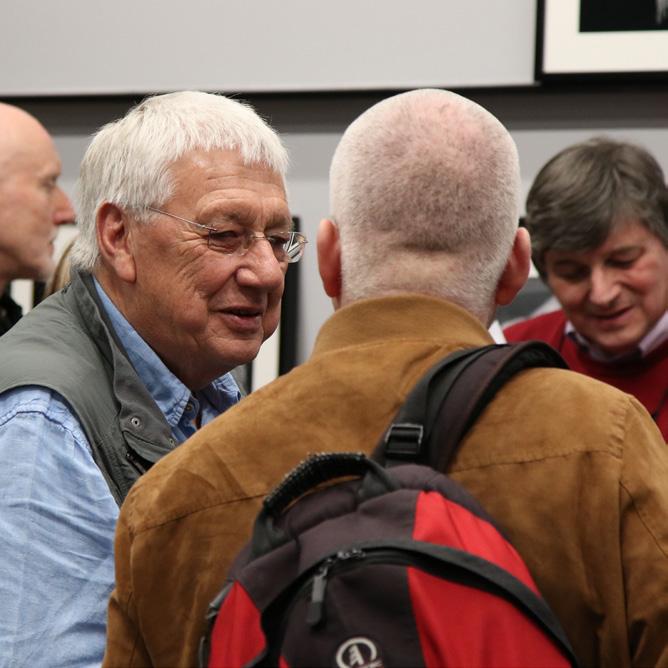
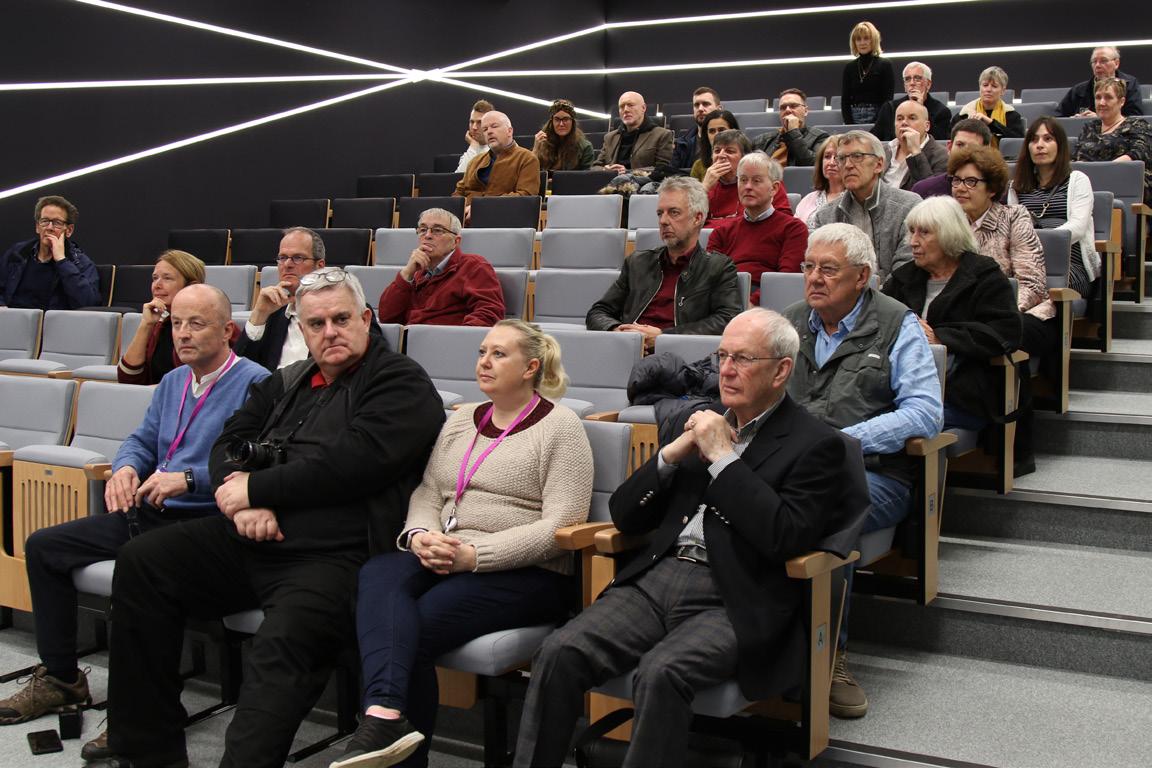
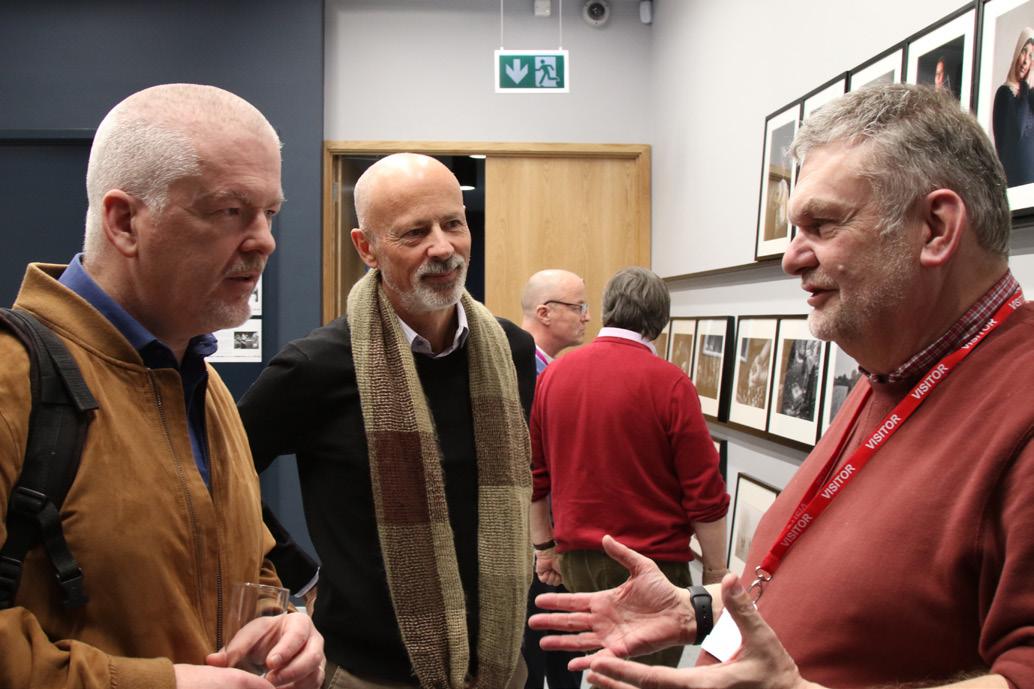
Documentary Photographer of the Year 2021











